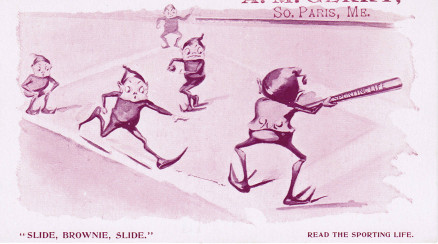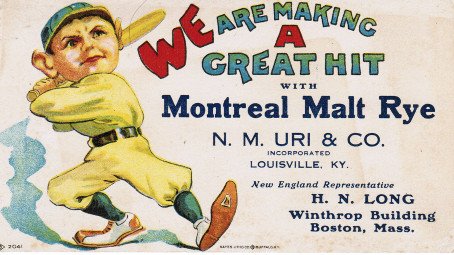Sets H 804-8 and H 804-29 both advertise a weekly newspaper called Sporting Life. Sporting Life was a popular newspaper which chronicled much of baseball's bygone happenings, front office maneuvers and legalities as well as ball field conflict and player shenanigans, minor league as well as major league. Sporting Life first appeared in 1883 as a reading market for baseball news was developing rapidly. It was published weekly in Philadelphia and sold for five cents a copy. Previously, the New York Clipper had been the best source for early baseball news.
There was a second new source of baseball news during the late 19th century. It was The Sporting News founded in St. Louis on Saint Patrick's Day 1886. The two papers were bitter competitors for more than three decades until the Sporting Life folded in 1917. Competition between the two was intense, often fierce, from the start. Both papers also editorialized and frequently differed on major issues such as establishment of a new major league, the behavior of John McGraw, and attempts of players to establish better contract conditions. Yet, the two papers supplemented each other to a large degree as the Sporting Life was often a better source for east coast information while the Sporting News was a better source for western leagues. The Sporting News, still published but content not limited to baseball, was once known as "the baseball bible."

Clever, Antiquated Writing
While both papers emphasized baseball, they originally had other sections covering a myriad of sporting topics such as boxing, horse racing, trap shooting, billiards, and even "theater." Both papers were prime examples of the often imaginative sports writing style used during the late 19th and early 20th centuries. Alliteration, hyperbole and initials appear page after page, issue after issue, year after year.
Colorful, clever, antiquated, Victorian language abounds. "Billy Barnes Dead. The Veteran Called Out by the Great Umpire" headlined one article. "High ales got the better of him" explains the release of a pitcher. Mordecai "Three Finger" Brown was described as "the man with missing digits." Outfielders were frequently called "suburbanites."

While this first appears to be an advertising trade card, the reverse side reveals it to be a BLOTTER card.